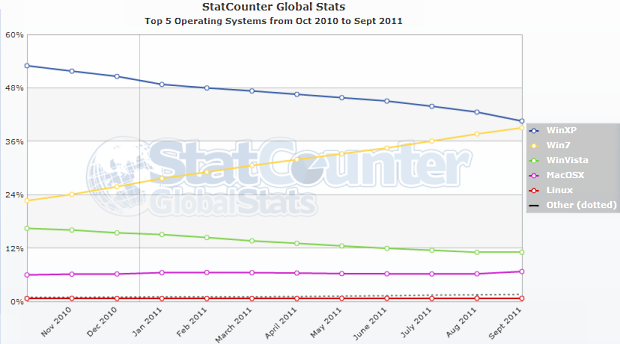Windows 7 overtakes Windows XP global share

More market figures this morning, and Windows 7 has finally taken over Windows XP in worldwide usage shares, according to web tracking company StatCounter.
October's statistics show Windows 7's global marketshare stands at just over 41 percent, while Windows XP holds a hair's breadth away from 40 percent.
In between the two, Windows Vista -- long believed to be one of Microsoft's biggest mistakes in the operating system race -- dipped below 11 percent. Apple's Mac OS X remained steady, but rising slightly at nearly 7 percent.

Windows XP, first released in 2001, and at over ten years old, is the world's most popular operating system to date. But its launch did not go without fault.
Volume license keys were acquired by hackers only weeks after the launch, which perpetuated widespread illegal piracy of newly released operating system in emerging markets, particularly. Microsoft also scaled down its launch party in the wake of the September 11th attacks, further impeding the highly anticipated marketing campaign by the company.
This year, however, shortly before marking its tenth anniversary, the ageing operating system dipped below the global 50 percent marketshare mark, making way for the newer Windows Vista successor, a client which left Microsoft dealing with a backlash from customers.
Onwards and upwards from Windows 7, we have the next-generation operating system, yet to be named officially but dubbed 'Windows 8', which is heavily focused on the upcoming post-PC world of tablet and slate computing.
Windows 8, while featuring the traditional desktop, masks it behind a wall of the Start screen; a Metro user-interface inspired full-screen view of applications and dynamically updating tiles, for which users can customise and personalise.
Windows 8 has already stirred controversy by displacing the desktop behind Metro, and lacking direction for the traditional PC market. While Windows 8 is designed for tablets in mind, but for PCs also, it remains clear that the current incarnation, Windows 7, will be difficult to shift, and should expect a high marketshare for some years to come.
Related:
- Ten years since Windows XP hit manufacturing
- Windows XP finally dips below 50 per cent mark
- Five core criticisms of Windows 8
- Gallery: How does the Windows 8 'out of box' experience fair up?
- ZDNet's Great Debate: No post-PC era vs Pro post-PC era
- Windows 8, Office 15: Get used to Metro, it'll be everywhere